Finished “The Dawn of Everything.” What if things didn’t have to be this way? You're born into a social order; you inherit this peculiar world. You are told at every stage in your life, implicitly and explicitly, that this is How Things Are. Like a tax bill or pain seen in a mirror, these facts are very much with us: divisions, walls, laws, property, and coercion; each as eternal as the hands of the compass rose.
Moreover, we are told this is how things *had * to be. We are taught in our history that certain social structures are inevitable: that as soon as farming began, we got surplus; as soon as surplus appears, that meant inevitably soldiers, kings, systems of order and domination. The works. We have been taught that that is evolutionarily necessary, like night follows day.
The Dawn of Everything disagrees. Using a buffet of global anthropology findings, deep history, and indigenous critiques of Western society, TDoE suggests that the human experience of living in organized communities is much more diverse and unpredictable than we think.
The authors argue that, historically, societies don’t move from A-to-Z; our past is actually something more complicated. In North America alone, there was an entire universe of complicated and varying systems—nations with sacred kings but no coercion; cities where there were seasonal governments; spectrums of sexual liberation; communities of little work and much leisure—forgotten societies rich with rainbows of optional orders, like Solomon arrayed in all his glory.
Calling TDoE a history of anarchism isn’t quite right, because even that is too narrow, and because these possibilities are in the present too, if we could but see then. One of the greatest nonfiction books of the last ten years. A pleasure for the heart and the mind. We can do better.





